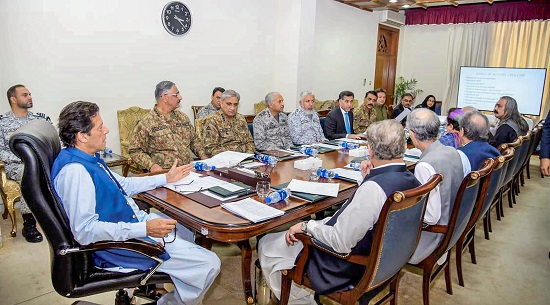
Pakistan’s Prime Minister Imran Khan is an angry man. But that’s understandable because even before he could fully savour the euphoria of his US visit (the success of which he likened to “having won the World Cup”), his Indian counterpart Narendra Modi spoilt the party by altering the seven-decade old status quo on Kashmir. But there’s more to it- by abrogating Articles 370 and 35A of the Indian constitution and carving out two new Union Territories (J&K and Laddakh) out of what was earlier the state of Jammu and Kashmir, Modi also disproved the prediction made by Khan just four months ago to a group of foreign journalists when he said that “Perhaps if the BJP, a right-wing party, wins, (then) some kind of settlement in Kashmir could be reached.”
Even though abrogating Article 370 and 35 A was part of the BJP-led NDA’s election manifesto it seems that Islamabad and Rawalpindi didn’t take this forewarning seriously. Perhaps, since this promise had also been made by the NDA in its last election manifesto but not acted upon and so Pakistan’s Foreign Office may have rejected this as another election gimmick. Even when New Delhi rushed additional security forces into Kashmir, the Pakistani establishment and its army failed to connect the dots. US President Donald Trump’s talk about him being asked by Modi to mediate between India and Pakistan on the Kashmir issue could also be a reason why the otherwise deeply suspicious Pakistan Army failed to visualise this eventuality.
Miffed by the latest developments in J&K, Pakistan has resorted to a series of knee-jerk reactions and in the process ended up inadvertently making some monumental blunders that give India even more substance to expose the absolute fallacy of Islamabad’s narrative on the issue of Kashmir. Pakistan Foreign Minister Shah Mahmood Qureshi is reported to have said that “Indian move to revoke Article 370 has no legal or constitutional justification.” But he has failed to offer any justification to buttress his views other than his plea of J&K being an “international dispute” which has no bearing on this move. Qureshi’s anger is also understandable but in case he wants to be taken more seriously by the international community then he will have to replace rhetoric with logic and with Washington terming India’s actions in J&K as an “internal matter” it should be clear to him that his is just a voice in the wilderness.
On the other hand, by using constitutional provisions and following legitimate legislative procedures to permanently alter status quo on Kashmir, New Delhi has sent out a strong signal to the world that J&K is an integral part of India and this is what appears to have actually rattled Islamabad. But Qureshi conveniently forgets that if Islamabad wants the international community to view abrogation of Articles 370 and 35 A along with the reorganisation of J&K’s administrative structure as an act that has “no legal or constitutional justification,” then doesn’t the same yardstick also apply to Pakistan’s unilateral decision of handing over Shaksgam Valley, which is part of the Hunza-Gilgit region of J&K, to China in 1963?
One of the most serious reaction is Khan’s aggressive announcement that “incidents like Pulwama are bound to happen again, (and) I can already predict this will happen.” This isn’t a mere foreboding or the emotional outburst of an out-manoeuvred politician; when one co-relates this with his own recent admission at United States Institute of Peace during his three-day US visit that “when you talk about militant groups, we still have about 30,000-40,000-armed people who have been trained and fought in some part of Afghanistan or Kashmir,” his rant actually turns out to be a sinister threat and a clear expression of intent. Additionally, by warning that “there will be bloodshed,” Qureshi has literally let the cat out of the bag!
Pakistan’s special advisor to PM Imran Khan for information and broadcasting, Firdous Ashiq Awan’s declaration that “Pakistan will continue to extend moral, diplomatic and political support to Kashmiris until they achieve their right to self-determination under UN Security Council resolution” is fine. But how does any sane person decipher Pakistan Army chief Gen Qamar Javed Bajwa’s pledge that “Pakistan Army firmly stands by the Kashmiris in their just struggle to the very end. We are prepared and shall go to any extent to fulfil our obligations in this regard”?
Since an army has only military means and warlike material at its disposal, isn’t Gen Bajwa’s specific reassurance amount to directly or indirectly providing military support to terrorist groups operating in Kashmir? Once again, there’s a need for New Delhi to co-relate this statement with undisputable proof of Pakistan army patronising terrorist groups that are fighting in neighbouring countries. Isn’t it because of this that Pakistan has landed itself in the grey-list of the Financial Action Task Force (FATF)? Therefore, Gen Bajwa’s promise to “go to any extent” in helping Kashmiris to fight against New Delhi’s decision (which has constitutional sanctity) needs to be brought to the notice of the international community and FATF yet once again!
Tailpiece: New Delhi can’t afford to be complacent because the Pakistan Army will definitely escalate violence levels through its proxies to keep the pot in Kashmir boiling. Hence, rather than dismissing the menacing voices emanating from Pakistan as hollow threats arising out of anger and sheer frustration, it would be more appropriate for New Delhi to pay heed to the old saying that one must always “listen to people when they are angry, because that is when the real truth comes out!”
